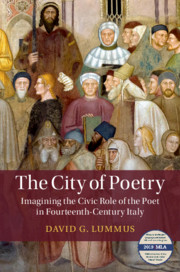Book contents
- The City of Poetry
- Cambridge Studies in Medieval Literature
- The City of Poetry
- Copyright page
- Epigraph
- Contents
- Acknowledgments
- Note on Translations
- Introduction
- Chapter 1 Albertino Mussato, Poet of the City
- Chapter 2 Dante Alighieri, Poet without a City
- Chapter 3 Francesco Petrarch, Poet beyond the City
- Chapter 4 Giovanni Boccaccio, Poet for the City
- Epilogue
- Bibliography
- Index
- Cambridge Studies in Medieval Literature
Chapter 1 - Albertino Mussato, Poet of the City
Published online by Cambridge University Press: 03 December 2020
- The City of Poetry
- Cambridge Studies in Medieval Literature
- The City of Poetry
- Copyright page
- Epigraph
- Contents
- Acknowledgments
- Note on Translations
- Introduction
- Chapter 1 Albertino Mussato, Poet of the City
- Chapter 2 Dante Alighieri, Poet without a City
- Chapter 3 Francesco Petrarch, Poet beyond the City
- Chapter 4 Giovanni Boccaccio, Poet for the City
- Epilogue
- Bibliography
- Index
- Cambridge Studies in Medieval Literature
Summary
The first chapter examines notary-poet Albertino Mussato’s defenses of poetry in relation to his political role in Padua between 1309 and 1320 and to the poetry he composed during this period, a Senecan tragedy, Ecerinis (1314), and a Lucanian epic, De obsidione civitatis Padue (1320). Challenging received notions that Mussato’s defenses of poetry are not politically oriented, it argues that Mussato employs them to authorize his political role in the city. It describes Mussato as the poet of the city inasmuch as he establishes an institution of poetry which allows him to participate with increasing authority in the political debates of his city. This institution is formally recognized in the civic sphere with Mussato’s crowning as poet laureate in 1315. If in his defenses of poetry Mussato establishes the poet as equal to the theologian, then in his Ecerinis and De obsidione he performs that role by seeking to provide moral and political direction to the Latinate notaries and novices of the city. He assumes the role traditionally held by theologians of influencing the moral and political outlooks of the city’s inhabitants.
- Type
- Chapter
- Information
- The City of PoetryImagining the Civic Role of the Poet in Fourteenth-Century Italy, pp. 22 - 62Publisher: Cambridge University PressPrint publication year: 2020



